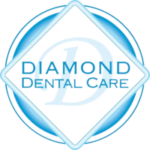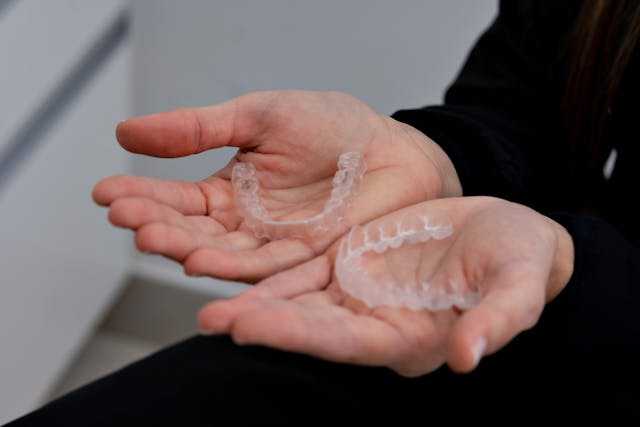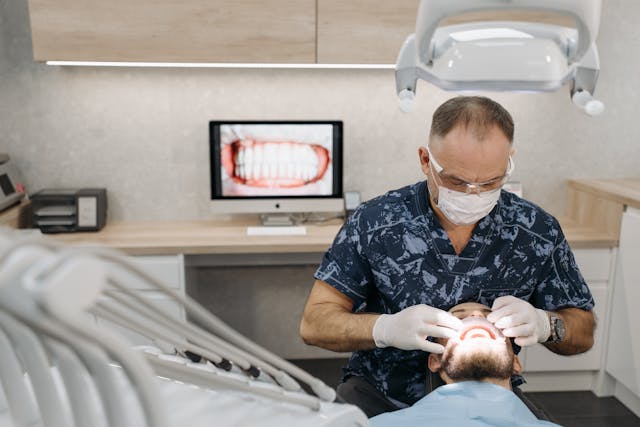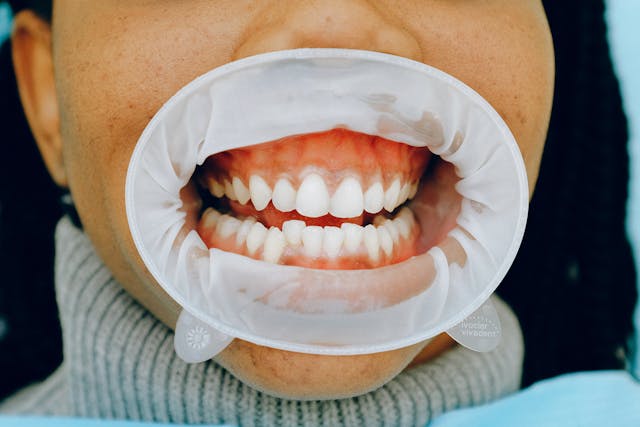Introduction
Stress is a common part of life, but did you know it can directly impact your oral health? From teeth grinding to gum disease, stress can cause a variety of dental issues that, if left unchecked, could lead to long-term damage. Understanding these effects and taking action can help you maintain a healthy smile.
Teeth Grinding (Bruxism)
Oral health is crucial and regularly needs care. When stressed, your body may respond by clenching your jaw or grinding your teeth, often without you even realizing it. This condition, known as bruxism, can wear down your enamel, cause jaw pain, and lead to serious dental problems over time.
Gum Disease and Stress
Stress weakens your immune system, making it harder for your body to fight infections, including gum disease. High-stress levels can lead to increased inflammation, causing gingivitis or even advanced periodontal disease if left untreated.
Dry Mouth and Stress
Chronic stress can reduce saliva production, leading to dry mouth. Saliva is essential for washing away bacteria and neutralizing acids that cause tooth decay. Without it, you’re at a higher risk for cavities and bad breath.
Canker Sores and Stress
Many people experience canker sores during periods of high stress. These small, painful ulcers inside the mouth can be triggered by immune system responses and inflammation caused by stress.
TMJ Disorders and Stress
Stress can cause excessive tension in your jaw, leading to temporomandibular joint (TMJ) disorders. Symptoms include jaw pain, headaches, and difficulty chewing, which can worsen without proper treatment.
Psychological and Behavioral Effects on Oral Health
Neglecting Oral Hygiene Due to Stress
Stress can cause people to neglect their daily oral hygiene routines, leading to plaque buildup, cavities, and gum disease. Staying consistent with brushing and flossing is important, even during busy times.
Smoking, Alcohol, and Unhealthy Coping Mechanisms
Many people turn to smoking or alcohol to manage stress, but these habits can be detrimental to oral health. Smoking increases the risk of gum disease and tooth loss, while alcohol can lead to dry mouth and enamel erosion.

Managing Stress to Protect Your Oral Health
Practice Relaxation Techniques
Incorporating relaxation methods like meditation, deep breathing, and exercise into your routine can help reduce stress and its impact on your oral health.
Maintain a Healthy Diet for Your Teeth
Eating a balanced diet rich in vitamins and minerals can strengthen your teeth and gums. Avoid excessive sugar and caffeine, which can worsen stress and lead to dental issues.
Establish a Strong Oral Care Routine
Brushing twice a day, flossing daily, and using mouthwash can help prevent stress-related oral health problems. Regular dental check-ups are also crucial.
Custom Nightguards for Bruxism
If you grind your teeth at night, a custom-fitted nightguard from your dentist can protect your enamel and prevent jaw pain.

Visit a Trusted Dentist for Stress-Related Oral Issues
Why Choose Diamond Dental Care?
At Diamond Dental Care, we understand how stress can affect your oral health. Our experienced team provides personalized treatments for bruxism, gum disease, TMJ disorders, and more. Visit us at 303 South Diamond Bar Blvd, Ste 2C, Diamond Bar, CA 91765, or call (909) 860-7579 to schedule an appointment.
Conclusion
Stress can have a significant impact on your oral health, but with the right care and preventative measures, you can maintain a healthy smile. Managing stress, maintaining a good oral care routine, and visiting your dentist regularly are essential steps to keeping your teeth and gums in top shape.
FAQs
Q1: How do I know if I grind my teeth at night?
A: Common signs include jaw pain, headaches, and worn-down teeth. Your dentist can diagnose it during a check-up.
Q2: Can stress cause gum disease even if I brush regularly?
A: Yes! Stress weakens the immune system, making you more susceptible to infections like gum disease.
Q3: What is the best way to relieve jaw pain from stress?
A: Try gentle jaw exercises, relaxation techniques, and using a warm compress. A dentist may also recommend a nightguard.
Q4: How does dry mouth affect my oral health?
A: Dry mouth increases the risk of cavities and bad breath because saliva helps wash away bacteria.
Q5: Where can I get help for stress-related dental problems in Diamond Bar?
A: Visit Diamond Dental Care at 303 South Diamond Bar Blvd, Ste 2C, Diamond Bar, CA 91765, or call (909) 860-7579 for expert dental care.



